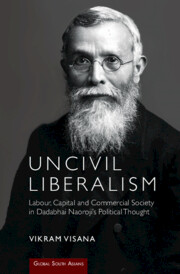Book contents
- Frontmatter
- Dedication
- Contents
- List of Abbreviations
- Acknowledgements
- Introduction
- 1 Sociality in an Imperial and Industrial Age
- 2 Sociality and the Parsis of Western India
- 3 Civil Society and Social Reform
- 4 Conceptualizing the Drain Theory
- 5 Making Commercial Society in India
- 6 Making Commercial Society in Britain
- 7 The Afterlives of Naoroji’s Political Thought
- Conclusion
- References
- Index
2 - Sociality and the Parsis of Western India
Published online by Cambridge University Press: 27 September 2022
- Frontmatter
- Dedication
- Contents
- List of Abbreviations
- Acknowledgements
- Introduction
- 1 Sociality in an Imperial and Industrial Age
- 2 Sociality and the Parsis of Western India
- 3 Civil Society and Social Reform
- 4 Conceptualizing the Drain Theory
- 5 Making Commercial Society in India
- 6 Making Commercial Society in Britain
- 7 The Afterlives of Naoroji’s Political Thought
- Conclusion
- References
- Index
Summary
Regarded as exemplary entrepreneurs, professionals and philanthropists by the early decades of the nineteenth century, the Parsis of western India were the toast of the town. The very model of Victorian good character, they were known for their Anglophilia in matters of domesticity, dress and leisure which had developed through a sustained process of negotiating British cultural norms in an effort at community self-fashioning. Similarly, British officials cooed about the Parsis as models of colonial loyalty. This mutual admiration was born in part due to the community's historical role as a comprador class facilitating the penetration of European capital into the west Indian hinterland. Common self-interest notwithstanding, there was a genuinely held belief that the Parsis were agents of liberal reform and ‘civilization’ in India and abroad. Henry Bartle Frere, as the Governor of Bombay from 1862 to 1867, even mooted the idea of encouraging Parsi emigration to East Africa as agents of progress. An ardent admirer of Henry Maine's historical sociology, Frere imagined the Parsis as a vanguard community that might develop more ‘backward’ indigenous cultures.
This chapter explores the nineteenth-century Parsi reformist debates which informed Dadabhai Naoroji's early liberal politics. While Frere and his British colleagues’ admiration for the Parsis was motivated by a long-standing relationship with the community as a comprador class, the following argument reveals a Parsi life-world in flux which would give new Parsi debates a critical edge. As such, this chapter traces the contours of the Parsi life-world in religion, commerce and institutional politics from the mid-eighteenth century to the mid-nineteenth century. While historians have outlined the social and political context of Parsi life in western India, this chapter does not aspire to a comprehensive social history of this minority. Instead, it focuses specifically on motivations and methods of civil association in order to identify the inherited political and social ‘prejudices’ which informed Naoroji's future thinking on sociality.
The years of Bombay's ‘modernization’ were formative for Naoroji. Traditionally, the so-called Cambridge school of Indian history regarded the existence of urban politics as evidence of a creeping European modernity that incentivized Indian elites to take up new positions in the expanded educational and political establishments of the presidency towns.
- Type
- Chapter
- Information
- Uncivil LiberalismLabour, Capital and Commercial Society in Dadabhai Naoroji's Political Thought, pp. 51 - 71Publisher: Cambridge University PressPrint publication year: 2022

